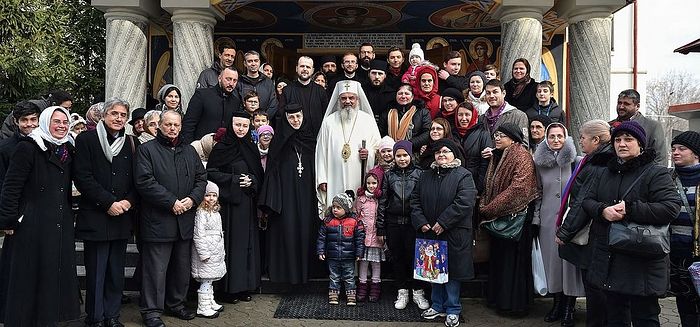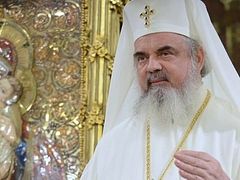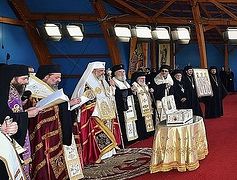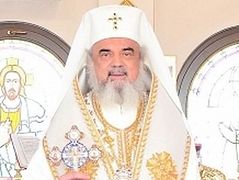Source: Basilica News Agency
January 10, 2016
On January 10, the Romanian Orthodox Church celebrates St. Antipas from Calapodeşti and on this day, His Beatitude Daniel, Patriarch of the Romanian Orthodox Church visited the monastic community and the faithful of Christiana Monastery in Bucharest.
His Beatitude delivered a sermon and after the celebration offered presents to the elderly who live at and are taken care of at the social house of the monastery. In 2005, an old folk's home for 24 persons was set up within Christiana Monastery with medical facilities and other spaces for physical recuperation.
In his sermon the Patriarch of Romania emphasized the spiritual teaching of the Gospel text read that day in all places of worship (Matthew 4:12-17) presenting the beginning of the Lord’s ministry:
Today’s Gospel text shows us two great truths: after Jesus Christ the Savior was baptised in the River Jordan by John, He went back to Nazareth where He stayed only a short time and then moved to Capernaum because He was not well received in Nazareth. There He was hosted by the family of St. Simon Peter. The Savior often preached in the synagogue of Capernaum, as well as in Galilee near the sea. The area was inhabited not only by Jews but also by Gentiles, namely nations with a culture different from that of the Jews. Jesus Christ moved especially to Nazareth to the area of Capernaum close by the sea because the prophecy of Isaiah who said: “Land of Zebulon and land of Naphtali, the Way of the Sea, beyond the Jordan,Galilee of the Gentiles — the people living in darknesshave seen a great light; on those living in the land of the shadow of death a light has dawned”, had to be fulfilled. This prophecy shows us two categories of people who receive the light of Christ. Although the Jewish people had received several lights of the saving truth through the Law of Moses and through the prophets, they were yet in a sort of darkness because they had not received the fullness of the divine revelation. The people lived in incertitude and were searching for the true Messiah. They were waiting for the Messiah prophesied by the prophets, but they did not know His identity, what sort of liberator the Messiah would be, because the people were already under Roman occupation and many thought that the Messiah would be a political liberator, while some others thought He would be a healer of souls and a redeemer of sins and of lack of knowledge. Thus, the Jewish people saw a great light, since they were used to smaller lights of the revelation, but not a great light, while the pagan nations were living in the land of the shadow of death as they did not at all know the true God, the Creator of heaven and earth, but confounded the Creator with His creatures and worshipped these creatures.
The Patriarch of Romania explained the spiritual meaning of the Great Light in the prophecy of Isaiah:
The great light is not the light of the sun or of several stars gathered together, but a Person. The great light is the God-Man. This Light exceeds all the prophets before Him who were lights of the Holy Spirit. Now, God the Word by Whom God the Father has made everything that exists, the visible world and the invisible one, represents the Great Light which shines not only in the life of every human who comes to live in the world, but in the entire universe.
Jesus Christ started preaching His Gospel by saying: "Repent, for the Kingdom of Heaven is at hand" ... There is a great light in the beginning, middle and end of today’s Gospel text. The return on the path to salvation from the way to perdition is accomplished through repentance. Repentance is not a simple emotional regret, but a change of way of thinking, speaking and acting, a change of life. The sins that we commit after baptism can be forgiven only through the baptism of tears, through the sacrament of Repentance or of Confession, of confessing sins and receiving forgiveness. Thus, we have Baptism as the basis of salvation, while repentance must be repeated as many times as possible in our lives.
This work of repentance is so necessary and those who make the gifts of Baptism fruitful all their life through repentance, prayer, fasting and good merciful deeds come to resemble God. Repentance is the continuation of Baptism, the permanent renewal of our relation of love with God. We separate from God through sin and renew our union with God through repentance. This is why, in the Orthodox Church we repent, confess and read many prayers of repentance before communicating with the Body and Blood of the Lord.
In the sermon His Beatitude has also spoken about the life of St. Antipas from Calapodeşti, a Romanian monk who lived in Romania, on holy Mount Athos and in Russia, at Valaam Monastery, where he died:
St. Antipas is the first Romanian Athonite monk declared a saint 24 years after his passing away. On Mount Athos, St. Antipas lived at the Lacu Romanian skete where the monks live a very ascetic life. The cell he was given to live in was half ruin, but he repaired it. He found a burnt icon in the cell and gave it to the iconographer Paisie to clean it. Paisie brought it back and told him that miraculously after he cleaned the icon it appeared as new. St. Antipas kept this icon with him all his life. After a while he left Lacu Skete and settled in the north of Mount Athos at Esphigmenou Monastery. There, at this monastery he received the great schema and the name of Antipas and was ordained as hierodeacon and hieromonk. Afterwards, he came back to Moldova, asked by two Romanian monks, Nifon and Nectarie, who began to build the Prodromos Romanian skete at Mount Athos. They asked him to collect aid for continuing the construction of this Romanian skete.
At the end of the Divine Liturgy His Beatitude offered the monastery, as a sign of blessing, several liturgically, pastorally and spiritually useful books and small icons depicting Jesus Christ, our Savior and of St. Antipas from Calapodeşti to the faithful present.
Then the Patriarch of Romania visited the elderly living in the old folk’s home of Christiana Monastery, blessed them and offered them small icons, calendars and other books. His Beatitude also visited the main church of Christiana Monastery which is under construction.




